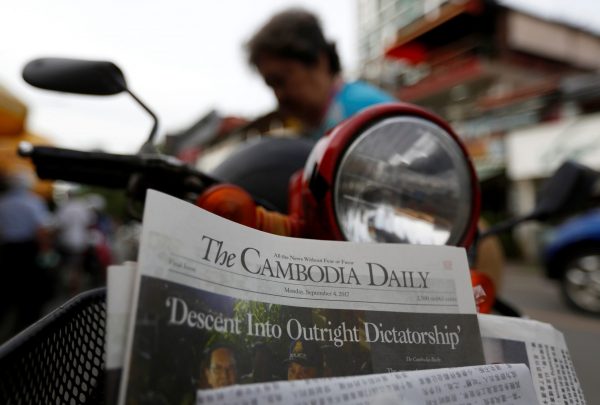Competition among political parties increased, thanks to the unification of the opposition parties in 2012 ahead of the 2013 national election. The economy also continued to grow extraordinarily well. Growth has averaged 7 per cent per year since 1993, and poverty has fallen more than 1 per cent per year on average since 2003. Inequality has also declined. Vertical political accountability has been strengthened markedly, thanks to decentralisation and deconcentration. Cambodians are increasingly able to hold local leaders to account through local democratic processes.
But the 2013 polls were a turning point. Although they won the election, the ruling Cambodian People’s Party (CPP) lost the popular vote for the first time since 1998, seeing its popular vote plummet by more than 20 per cent. To its credit, the CPP-led government subsequently implemented various reforms aimed at winning the hearts and minds of Cambodian voters. The CPP has permitted moderate reforms, restructured the National Electoral Committee and increased public servants pay. And in August 2017, Hun Sen also promised a slew of new benefits for garment workers, including a big increase in their monthly minimum wage.
But with the carrots have come sticks.
Indicators of horizontal accountability have either stalled or are in decline. Local and international NGOs and media operated with comparatively little constraint from the state before the 2013 national election period. Since then, the government has made disturbing moves that wipe out progress made in terms of political openness. Among a range of actions is the passage of legislation governing NGOs.
Despite a boycott by the opposition, the parliament passed the Law on Associations and Non-Governmental Organisations, which requires the nearly 5000 domestic and international NGOs that work in the country to register with the government and report their activities and finances or risk fines, criminal prosecution and being shut down. In August 2017, the government used this law to order the National Democratic Institute (NDI) to shut down its operations and repatriate its foreign staff, accusing the NDI of illegally operating in the country.
The Cambodian government has also targeted foreign and foreign-linked media. In August 2017, the government accused the Cambodia Daily of failing to pay more than US$6 million in taxes, giving the paper one month to resolve the issue or risk being shut down. The Daily is a US-owned outlet credited for its reports critical of the government. In addition, the government instructed more than a dozen radio stations across the country to cease operations, accusing them of failing to report how much and to whom they sell their airtime.
Two major factors — one internal and one external — may explain the government’s recent measures against international NGOs and media. Internally, these measures were escalated as a result of the June 2017 local government elections, the result of which represented a big boost for the opposition Cambodian National Rescue Party and a serious blow to the CPP. After the June 2017 local government elections, the CPP still controlled the majority of local governments — 1156 or 70 per cent of communes. But the opposition party’s share of local governments increased about 12 fold in comparison with the last local elections held in 2012.
The external factor is the declining role of the United States as a champion of democracy. The drastic moves targeting US-based NGOs and media occurred in the aftermath of the election of Donald Trump. His election and subsequent attacks on mainstream media have disconcerted democrats at home and abroad and certainly delegitimised US efforts to promote liberal democratic principles internationally.
Furthermore, the failure of the United States to pre-empt and manage democratic breakdown in Thailand, and to promote democracy in Laos and Vietnam, only serves to diminish the US role in promoting democracy in Cambodia, and potentially gives the Cambodian government an excuse to maintain the status quo.
Likewise, Australia and European countries have been silent on these issues so far, showing a similar unwillingness to influence internal political decisions in Cambodia. The 2014 Australia–Cambodia refugee deal tainted Australia’s reputation as an altruistic donor to Cambodia, and has certainly undermined Australian leverage in promoting reforms in Cambodian domestic affairs. And European countries have been busy cleaning up the mess in their own backyard after the Brexit vote in 2016 and the rise of populist movements across the continent.
Meanwhile, Cambodia is increasingly dependent on China, and less and less so on Western countries. China is feeding the Cambodian economy, investing US$857 million (roughly 61 per cent of total FDI) and channelling US$320 million in aid (roughly 30 per cent of total aid) to the country in 2015. By contrast, investment and aid from Western countries is either modest or on the decline.
Whatever the mix of domestic and global political influences, the consequences of the CPP’s crackdown on Cambodia’s democracy are being felt. As long as the Cambodian government manages to maintain satisfactory economic performance, continues its piecemeal reforms benefitting the majority of the population, and promotes some appearance of democracy in the country, it will continue to demand difficult value judgments on the part of Cambodian citizens as to whether the CPP’s actions against the media and civil society are worth fighting back against.
Kongkea Chhoeun is a PhD Candidate at the Crawford School of Public Policy, The Australian National University.
This article was first published here on New Mandala.

